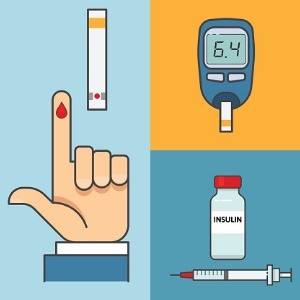
Diabetes is taking over the world – and not in a good way. This disease is growing at scary rates. Recent statistics show that here in Africa diabetes is the fast-growing chronic condition.
The importance of insulin
Diabetes comes down to insulin. Insulin is a hormone that regulates the amount of glucose (sugar) levels in the blood, and allows cells to turn glucose into energy throughout the body. Insulin keeps your blood sugar levels within a healthy range, and can also reduce your risk of diabetes complications, like blindness and gangrene.
There are two main types of diabetes. If you have Type 1, the specialized “beta” cells in your pancreas can no longer produce insulin. Because diabetics lack insulin, they have higher than normal blood-glucose levels.
Type 2 diabetes is when the body doesn’t respond effectively to insulin; meaning you’re insulin-resistant. As a result, your body is less able to take up glucose from the blood. In the earlier stages of Type 2 diabetes, the body responds by producing more insulin than it would normally need to. Depending on your level of insulin resistance, people with Type 2 diabetes may also need to take insulin injections to manage their blood sugar levels.
Insulin facts:
- Everyone needs insulin. Whether you make enough insulin or not is the issue. People who don’t have diabetes make enough of their own insulin to keep their blood sugar at healthy levels. People with Type 1 diabetes don’t produce any insulin, and need to inject themselves to maintain healthy blood sugar levels. People with Type 2 diabetes make insulin, but their bodies don't respond well to it. So, they may also need to take insulin.
- Insulin treatment is not a one-size-fits-all approach. The amount of insulin you need depends on the severity of your condition, your diet and level of activity.
- Insulin is a protein. Insulin must be injected with a syringe, an insulin pen, or an insulin pump for it to get into your bloodstream.
- Insulin can be divided into four types. Rapid-acting insulin: works within 15 minutes of injection, peaks after one hour, and lasts two to five hours. Short-acting insulin: works within 30 minutes of injection, peaks after two to three hours, and lasts five to eight hours. Long-acting insulin: reaches the bloodstream hours after injection, and lowers blood sugar levels gradually over 24 hours. Intermediate-acting insulin: reaches the bloodstream about two to four hours after injection, and is effective for 12 to 18 hours.
- Insulin can be injected in different parts of the body; your thighs, arms, and buttocks. Avoid injecting within about 5cm of your belly button as insulin isn’t absorbed well in this area. Insulin injection sites should be rotated. Vary the site where you inject insulin to prevent skin thickening and fatty tissue build-up.
- Insulin needs to be balanced with your food or calories. Opt for foods that are less likely to affect your blood sugar, like fish, leafy greens and eggs. Avoid sugar-spiking foods like potatoes, corn and peas, grapes and cherries.
- An insulin overdose can lead to low blood sugar levels; which can result in a coma – and even death. Too little insulin can lead to high blood sugar levels, which could also result in a coma. So, it’s vital to take your insulin exactly as prescribed!
- Although rare, insulin allergy can happen. Symptoms include itchy skin, redness, and wheezing. If you experience any of these symptoms soon after injecting insulin, call your doctor immediately. Usually an antihistamine is given to block the response of the immune system, until the body begins to accept the insulin.





 Publications
Publications
 Partners
Partners










